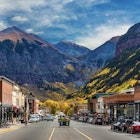
A guide to hiking the Wave, America's most exclusive trek
Jun 26, 2020 • 4 min read

With an acceptance rate of just 3.7%, you have better chances at getting into Harvard © pick-uppath / Getty Images
The United States is home to nearly 10,000 national and state parks with over 200,000 miles of trails stretching across its 50 states. The secret of "America the Beautiful" is out; last year, more than 90 million people visited her parks. As these outdoor experiences become overcrowded, travelers are heading to the backcountry to enjoy the solitude of the great outdoors.
If the pioneer in you is calling, one of America’s most exclusive unmarked hikes is waiting to be explored. With only 20 people permitted to hike per day, you’re more likely to get into Harvard than to win the lottery to hike this trail.
What to expect on the Wave hike
The Wave, at Coyote Buttes North, is located at the Utah/Arizona border in the Paria Canyon–Vermilion Cliffs Wilderness, a protected desert landscape, managed by the Bureau of Land Management (BLM). Although the striking sandstone rock formations are what entices photographers and hikers from across the world to enter its lottery, the voyage is just as remarkable.

Your adventure begins at the trailhead, where an old riverbed leads you into Paria Canyon towards a seemingly endless horizon of rust-colored Navajo rock. Without an officially developed trail or directional markers, follow a map provided by the BLM, with a series of visual cues guiding you through the rugged backcountry terrain. Left without cell service or digital maps, you must rely on the surrounding scenery to navigate.
After roughly 3 miles of trekking, the Wave finally comes into view. Its petrified sandstone bands glisten in the distance, changing colors as the sun moves across the sky. Trudging through sand dunes, begin your climb and edge closer. Savor the tremendous reward of successful navigation as you explore the bends and curves of this astonishing rock formation. Watch the bands of orange, pink, yellow, and red change colors as the sunlight strokes across it.
If you’re still feeling adventurous and wish to continue your expedition there’s plenty more to see just beyond the Wave: natural arches, petroglyphs, dinosaur tracks, and even a second wave-like formation.

How to get access to the Wave
Over 200,000 people entered the lottery last year hoping to win a chance to experience this unforgettable hike; 3.7% were lucky enough to win.
To protect the Wave’s delicate sandstone rock formation and surrounding ecosystem, the BLM established a raffle system to limit the number of visitors to 20 per day. Of the winners, 10 are selected from an online lottery drawn four months in advance, and 10 are selected in-person at the BLM office in Kanab, Utah.
Advanced online lottery
Set your reminders; the online lottery commences the first of each month at noon MT (Mountain Time) with a $5 non-refundable entry fee. Although only one application per month is permitted, your entry can include up to six people with three different favored hiking dates. If chosen, the one-time permit fee is $7.

Next-day in-person lottery
If you’ve found yourself in Kanab and are feeling particularly lucky, 10 permits are reserved at the BLM visitors center to hike the following day. Arrive early to register, as the drawing begins at 9am sharp. There’s no fee to enter, but if selected, your permit costs $7. This permit is non-transferable and only eligible for the following day. In 2020, the lottery drawing was moved to the local high school to promote social distancing. Check the BLM visitors center for more info.
Preparing for the hike
Although this hike isn’t physically demanding, preparation is crucial. Depending on the season, it’s important to remain aware of potential hazards due to extreme heat and weather patterns, such as flash flooding. In the late summer months, temperatures can be unforgiving, reaching as high as 120F (48C). Hydration is essential; the BLM and park rangers suggest 3L of water per person and packing high-energy snacks for sustenance.
It’s best to start your hike early in the morning to arrive at the Wave during midday when the formation is fully lit (this is also the best time for photos). If you’re hiking during the summer months, starting your trek at the first sun will also allow you to complete the trail before the strongest heat of the day.
Most importantly, the Wave is part of a protected wilderness area and garbage removal is fundamental to preserving the environment. Remember, leave no trace; all trash brought in, must be carried out.
You might also like:
The 10 best treks in the world
We've traveled 48 US states in a camper van - here's 10 you should visit
The best state parks in each state
Explore related stories









